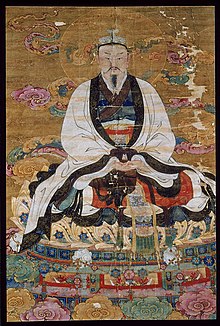Jade Emperor
| Jade Emperor | |||||||||||

Jade Emperor in a Ming Dynasty ink and color painting on silk, 16th century
|
|||||||||||
| Literal meaning | Jade Emperor | ||||||||||
|---|---|---|---|---|---|---|---|---|---|---|---|
|
|||||||||||
| Chinese | 天公 | ||||||||||
| Literal meaning | Heavenly Grandfather | ||||||||||
|
|||||||||||
| Chinese | 玉皇大帝 | ||||||||||
| Literal meaning | August Emperor of Jade | ||||||||||
|
|||||||||||
| Transcriptions | |
|---|---|
| Standard Mandarin | |
| Hanyu Pinyin | Yù Huáng |
| Transcriptions | |
|---|---|
| Standard Mandarin | |
| Hanyu Pinyin | Tiān Gōng |
| Southern Min | |
| Hokkien POJ | Thiⁿ-kong |
| Transcriptions | |
|---|---|
| Standard Mandarin | |
| Hanyu Pinyin | Yù Huáng Dàdì |
| Southern Min | |
| Hokkien POJ | Gio̍k-hông-tāi-tè |
The Jade Emperor (Chinese: 玉皇; pinyin: Yù Huáng or 玉帝, Yù Dì) in Chinese culture, traditional religions and myth is one of the representations of the first god (太帝 tài dì). In Taoist theology he is Yuanshi Tianzun, one of the Three Pure Ones, the three primordial emanations of the Tao. He is also the Cao Đài ("Highest Power") of Caodaism known as . In Buddhist cosmology he is identified with Śakra. In Korean mythology he is known as Hwanin.
The Jade Emperor is known by many names, including Heavenly Grandfather (天公, Tiān Gōng), which originally meant "Heavenly Duke", which is used by commoners; the Jade Lord the Highest Emperor, Great Emperor of Jade (玉皇上帝, Yu Huang Shangdi or 玉皇大帝, Yu Huang Dadi).
There are many stories in Chinese mythology involving the Jade Emperor.
It was said that the Jade Emperor was originally the crown prince of the kingdom of Pure Felicity and Majestic Heavenly Lights and Ornaments. At birth, he emitted a wondrous light that filled the entire kingdom. When he was young, he was kind, intelligent and wise. He devoted his entire childhood to helping the needy (the poor and suffering, the deserted and single, the hungry and disabled). Furthermore, he showed respect and benevolence to both men and creatures. After his father died, he ascended the throne. He made sure that everyone in his kingdom found peace and contentment. After that, he told his ministers that he wished to cultivate Tao on the Bright and Fragrant Cliff.
...
Wikipedia
